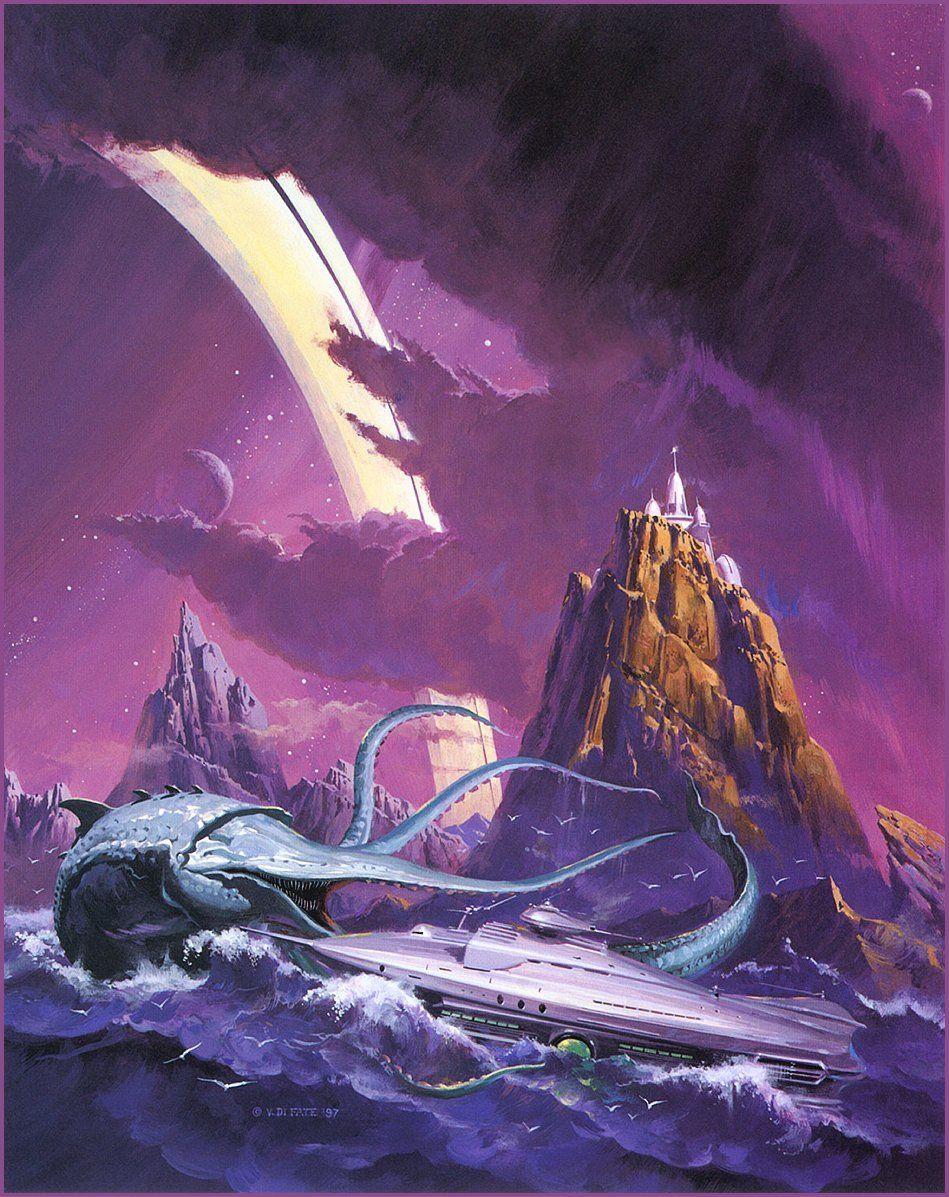
Cthulhu or Cuddly Water Entity?
Do you think there’s a case to be made that author Jerry Pournelle’s fun little juvenile novel STARSWARM might be paying homage to HP Lovecraft’s Cthulhu?


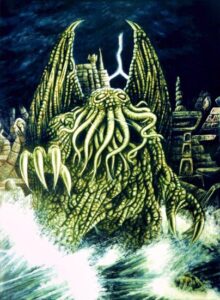
Cthulhu is a fictional cosmic entity created by writer H. P. Lovecraft and first introduced in the short story “The Call of Cthulhu,” published in the American pulp magazine Weird Tales in 1928.
In STARSWARM the plot revolves around an innocent teenage boy, Kip, who has grown up on a remote planet used primarily as a research station for its bizarre native life. The boy has been raised by both his “Uncle” Mike and an experimental computer program Gwen, written by his dead mother, (which talks to him through a chip implanted in his brain after birth) that slowly reveals more and more of his important destiny concerning control of the company which owns and controls the planet. Gwen helps him understand the significance of the Starswarms, massive super-intelligent plant-like creatures dwelling in the bottom of the planet’s countless shallow lakes and oceans. An obvious theme of the book is expressing the thoughts of computer-like entities, such as Gwen (the computer program) and the native alien neural nets.
What’s not obvious is the comparison of STARSWARM to the Great Old One within the pantheon of Lovecraftian cosmic entities. Lovecraft depicts Cthulhu as a gigantic entity worshipped by cultists. Its name was given to the Lovecraft-inspired universe where it and its fellow entities existed, the Cthulhu Mythos. In STARSWARM centaurs service rather than worship, but the conflict of belief in it’s lifeform is a center drama in the story.
STARSWARM may score major revelations and depth looked in this light, don’t you think?

Officially Starswarm is a 1998 science fiction novel by Jerry Pournelle. The plot revolves around a teenage boy, Kip, who has grown up on a remote planet used primarily as a research station for its bizarre native life. The boy has been raised by both his “Uncle” Mike and an experimental computer program Gwen, written by his dead mother, (which talks to him through a chip implanted in his brain after birth) that slowly reveals more and more of his important destiny concerning control of the company which owns and controls the planet. Gwen helps him understand the significance of the Starswarms, massive super-intelligent plant-like creatures dwelling in the bottom of the planet’s countless shallow lakes and oceans. An obvious theme of the book is expressing the thoughts of computer-like entities, such as Gwen (the computer program) and the native alien neural nets.
Kip has never known any life but his existence at the protected laboratory compound known as Starswarm Station. And for all that time he has heard the Voice: an artificial intelligence chip implanted in his skull. It guides him and helps protect him from the planet’s many dangers, including roaming bands of hostile centaurs and “haters.” But the startling discovery of who put the chip in his head – and why – leads Kip to revelations that could threaten the safety of the entire compound.
Luckily, he has friends Marty and Lara to help. But are three kids enough to save an entire planet?
Review
“An extremely strong story…with plenty of suspenseful action in a well-realized setting.” -Booklist
“This is one you won’t want to miss. [A] taut, credible, fast-paced adventure story.” -Science Fiction Chronicle
“SF veteran Pournelle demonstrates his gift for traditional SF adventures in this coming-of-age tales that combines fast-paced action with…an appealing protagonist.” -Library Journal
From the Inside Flap
“In a rare solo writing effort, Pournelle has done an excellent job of following the Heinlein tradition.” -The Denver Post
Starswarm is a Star
Reviewer: A 12-year-old reader from New York, NY USA
“Starswarm is one of my favorite books. It is the story of a boy with a computer chip implanted in his head. The chip keeps him company and helps him with homework. But as he gets older and finds out new things about the chip and who put it there, he is caught in a thrilling adventure that will keep you on the edge of your seat.”
“Starswarm is a dynamic coming-of-age tale, and not only is the characterization of Kip fully realized, but the emotional resonance between Kip and his friends rings true.” -SF Site
“Starswarm is a blast, and it has the same kind of heart and adventure that made Star Wars so appealing.” -The Flint Journal
CHAPTER ONE
Gwen
Kip could never remember a time when he couldn’t hear the Voice in his head. He could talk to it anytime he wanted by thinking in a special way, and the Voice would always answer. It didn’t matter when he called, or where he was. Kip was the only one in the whole world who could hear the Voice, and it had always said he should never tell anyone he could hear it.
For a long time Kip thought other people had their own Voice, but of course they didn’t. He couldn’t remember just when he had thought that out. He could never ask, of course, but grownups didn’t act like they had Voices. They forgot things. Of course Kip forgot things too, but the Voice never forgot anything.
Kip never told anyone about the Voice, not even Uncle Mike. He told Uncle Mike everything else. There was no one else to tell things to, no one else to run to when he was hurt or frightened. He and Uncle Mike lived by themselves in a big wooden frame house across the wide, graveled central field from the laboratory buildings of Starswarm Station. There were other people there, but the scientists were too busy to bother with a young boy, and there weren’t any other children at the station.
The household robots cooked and did most of the housework, but Uncle Mike had programmed them so that there was still work for Kip to do, because, he said, “A boy ought to learn to take care of himself and not have to depend on machines. Or other people.”
Kip knew about families and mothers and fathers because he could watch the TRI-V when Uncle Mike let him. He didn’t get to watch very much, because he had so much to learn. Uncle Mike always told him that men weren’t intended to live on Purgatory, and they had to learn early or the planet would kill them.
Kip knew what that meant. There was a big fence around Starswarm Station’s buildings and yards, and even that couldn’t keep everything out. Centaurs came looking for food in deep winter, and they’d eat anything, even dogs and people. Then there were the little furry things the scientists called by a long name, but everybody else called them haters because they hated everything they hadn’t killed. The fences couldn’t keep all the haters out when they swarmed, and then the men and dogs had to go out and Mil the haters. There were other things, and Kip had to learn about all of them.
It wasn’t a bad life for Kip even if he did wish he had someone to play with. When he was six, Uncle Mike taught him to shoot a pistol, but he couldn’t touch it unless Uncle Mike was with him. Uncle Mike was a hunter, and he took Kip with him sometimes. Uncle Mike caught animals alive for the station scientists. He never killed anything unless he had to. Of course on Purgatory he had to kill a lot of things because they would eat him, or the dogs, if he didn’t, but Uncle Mike didn’t hunt for fun, and he didn’t like people who did.
There were always the dogs to play with too. They had two whole teams of them, and there were usually puppies. The dogs were nice, and they understood a lot of what Kip said to them. They were almost as nice as other people. Even so, Kip sometimes felt lonesome, and he knew Uncle Mike was sorry about that, but they had to stay at Starswarm Station.
The TV showed Kip how other people lived. He could watch shows from Pearly Gates City, and everyone on TRI-V lived in families. Sometimes they did very silly things. Kip asked his Voice about the people on TRI-V, but the Voice wasn’t always able to tell whether Kip had been watching entertainment shows or news from Pearly Gates, or even a documentary from Earth. Usually he could tell when the show came from Earth, though, because there were so many people there, and they had all kinds of marvelous things that no one on Purgatory had.
For a long time Kip thought his Voice was God, because the Voice always spoke in stern unemotional tones like Brother Joseph reading the lesson, and it used words Kip didn’t understand. Besides, the Voice knew almost everything, and sometimes it could do strange things like bring him a new Teddy Bear.
Kip had always had a Teddy Bear. He thought he could remember when Mommy gave him Teddy, and it was one of the few memories of Mommy that he had. Teddy went everywhere with Kip. He was hugged and crushed at night, and dragged in the dirt all day. Once, one of Mukky’s new puppies got Teddy and chewed him. Mukky snapped at the puppy and growled at him a long time, and she whined because she was sorry until Kip told her it was all right and scratched her ears. Teddy had been a wreck, but Uncle Mike had fixed him. Over the years Uncle Mike changed Teddy’s stuffing and patched him until he wasn’t recognizable, but still he was Teddy.
Finally, though, Kip dropped Teddy into the wrong hole, and a firebrighter took him. Kip screamed, and although the dogs knew better they attacked the firebrighter because the dogs couldn’t stand to hear human children crying. Mukky’s puppy had to be killed, and Mukky was hurt, and firebrighter blood and guts got all over and inside Teddy. Not even Uncle Mike could do anything for him then. Uncle Mike asked Dr. Henderson, but no one knew any cure for the firebrighter smell, so they buried his Teddy Bear. It was his last connection with his mother, and Kip cried all night. Then he told the Voice about it. “I want Teddy back,” Kip told the Voice, and he cried again.
A week later the supply copter landed at Starswarm Station. When the pilot opened the cargo hatch there was a big brown stuffed bear sitting on top of the groceries and scientific equipment. He was almost an exact copy of what Teddy had been when he was younger and hadn’t been patched so much.
“Durndest thing,” the pilot said. “Not on any manifests. Just right there in the cargo. Found him last stop. Here, Kip, I guess you’ll want him.”
Kip nodded gravely and thanked the pilot. He was a nice bear, but he wasn’t Teddy. Kip kept him in his room. The new bear was never crushed at night or rolled through the dirt, or even chewed by Mukky’s puppies. It was a very proper bear, and he had his place in the corner by the big red and white toy box, and Kip liked him very much, but he didn’t love him because he didn’t come from Mommy.
That night Kip heard Uncle Mike and the pilot talking over whiskey.
“Nice of you to bring the bear for the boy, Cal,” Uncle Mike said.
“Not me,” Cal said. “Happened just the way I told you. Opened the compartment for final check before we took off, and there it was. No manifest, no papers, nothing. So I remembered your lad and decided to bring it along, but it weren’t none of my doing. Never even saw one of those things on Purgatory before. Have you?”
“No, but we don’t get to town very much,” Mike said. “Have another?”
“Sure. Well, it’s the darndest thing.”
So that was how Kip knew his Voice had brought the bear to Starswarm, and why he thought it was God. Brother Joseph had told Kip about prayers, and Kip knew all about them, because he’d prayed to his Voice. After supper that night he told the Voice that he knew it was God.
The Voice was very astonished by this theory. Kip knew, because the Voice told him so. It had to, because it didn’t have any expression. “i am astonished, i have told you my name is gwen,” the Voice said.
Kip was sitting quietly in the front room, with Uncle Mike dozing in the big easy chair facing the door. Uncle Mike never sat with his back to any door, not even his own, not even with the dogs outside and Mukky lying in the doorway, and Silver lying beside Kip.
“I thought Gwen was your secret name. God’s secret name.” Kim thought in the special way he used to talk with the Voice.
“i do not know the secret name of god. it is not required that i know. correction. many secret names of god are recorded. none are identified as uniquely true.”
Kip didn’t understand that at all, but he could tell that Gwen wasn’t God after all. “Well.” Kip thought, “even so I don’t need to say prayers because I can talk to you.” With the rest of his mind, the part that didn’t talk to Gwen, Kip wondered if grown-ups talked to God because Gwen wouldn’t talk to them.
“does uncle mike tell you to say prayers?”
Kip knew what was coming, but Uncle Mike taught him never to lie. Uncle Mike didn’t know about Gwen, but Kip knew Uncle Mike wouldn’t want him to lie to Gwen either. “Yes–well, he tells me to do what Brother Josef h says, and Brother Joseph says I must always say my prayers.”
“then you must say your prayers.”
“But why, if I can talk to you? Why can’t you say them for me?”
“you must always do as your uncle mike instructs you,” Gwen replied, and that wasn’t surprising, because Gwen always told him to do what Uncle Mike said, and to tell Uncle Mike about everything except about Gwen.
When Kip was seven, Brother Joseph came back from town with education screens and disks and began teaching Kip. Uncle Mike helped too. At first it was very hard, but then Kip could read and it was easier. Then it was very hard again because there was all that mathematics and arithmetic and the languages, and Earth histories about old countries that Kip wasn’t even sure existed because where did all those people live? Kip could look outside and see the horizon empty all around with nobody living there but Dr. Henderson and his scientists. There was a village of centaurs on the ridge (just out of sight unless Kip looked from the second-story window), but one research station of people and one village of centaurs wasn’t so crowded.
But then he learned about Earth, and how people lived on Earth for thousands of years until they invented space travel, and then someone invented the Drive that let them go from star to star, and they found other worlds they could live on. There weren’t many, and some of them weren’t very good worlds. Some of the worlds were owned by big companies. Purgatory was owned by Great Western Enterprises. There were mines, and factories, but that was all at Pearly Gates. Starswarm Station was owned by the Great Western Founda…
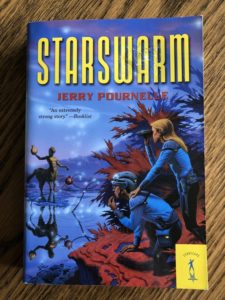
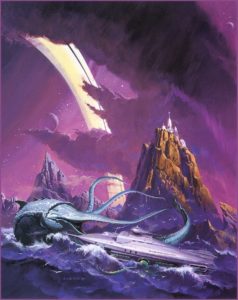
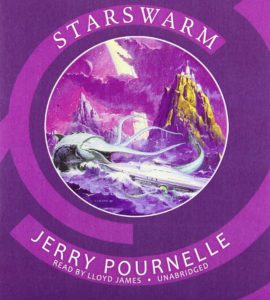



This amazing depiction of the STARSWARM is by artist Vincent Di Fate.